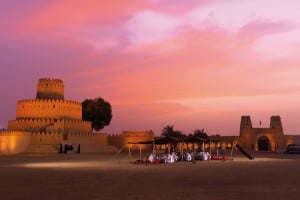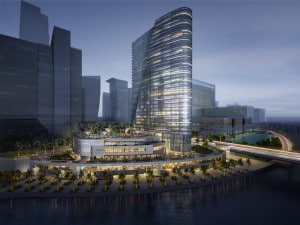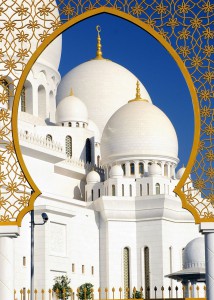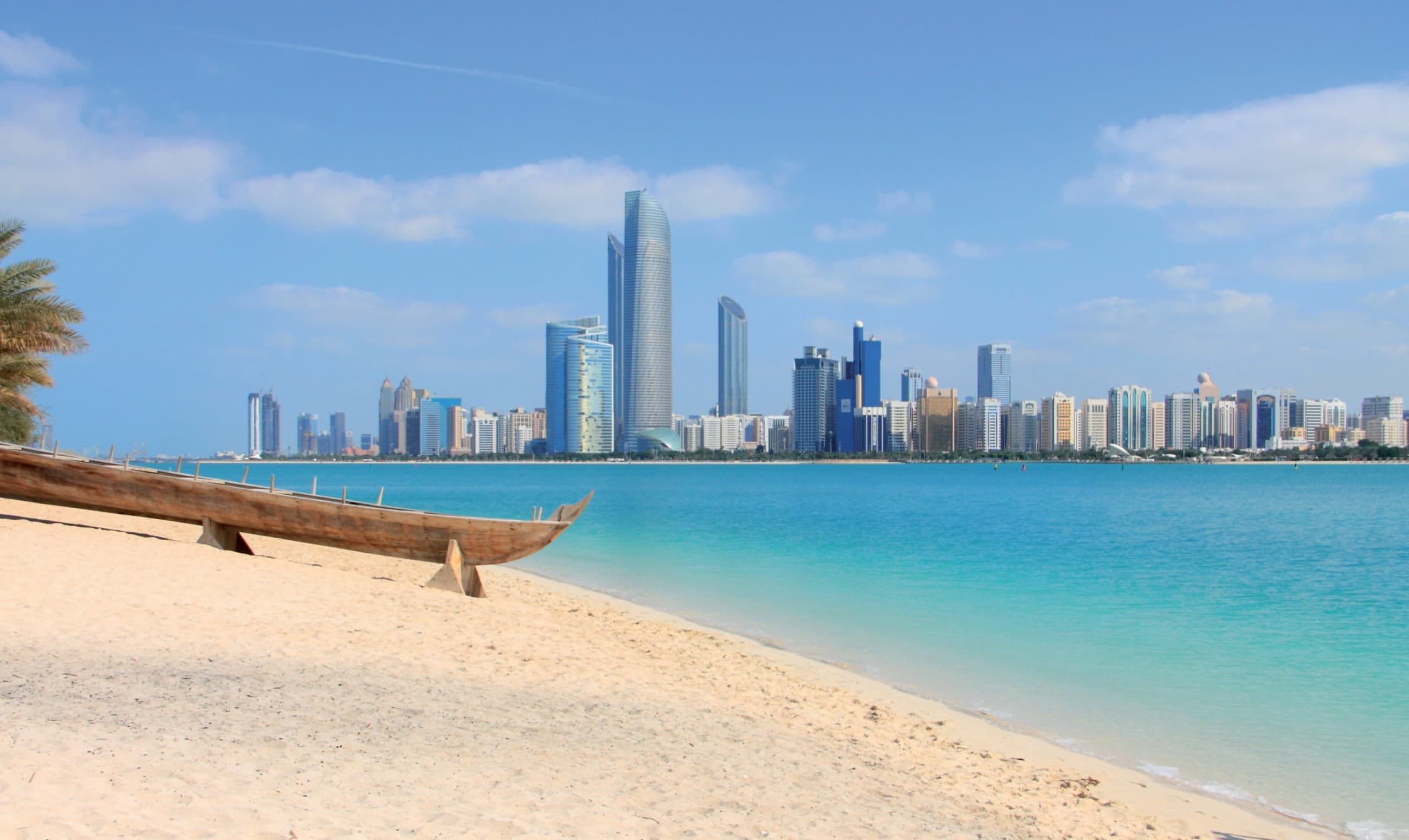Between the legendary Rub al-Khali desert and the deep-blue Gulf lies the largest and richest emirate of the United Arab Emirates: Abu Dhabi. Although deeply rooted in Islamic traditions, the desert state manages to fascinatingly combine tradition and modernity, art and culture. The strong affinity to their country is as much a characteristic of Emiratis as their tolerance and generous hospitality.
ATTRACTIVE OPPOSITES
The fabulous sandy beaches, picturesque mountains, spectacular desert landscapes and over 200 islands of the 67,340 square kilometre emirate are a revelation for nature lovers. Water sports enthusiasts, golfers, adventurers, connoisseurs – all will find holiday fulfilment here. Modern shopping centres and traditional souks, opulent mosques and contemporary museums, glittering skyscrapers and old forts: charming contradictions that make the eastern tip of the Arabian peninsula so attractive for tourists.

Abu Dhabi, which means “father of the gazelle“, is also the name of the capital of the United Arab Emirates (U.A.E). After Dubai, this up-and-coming metropolis with its population of around 1.2 million is the second largest city in the U.A.E. and is increasingly becoming a sought-after location for international companies. Businesspeople and tourists alike both benefit from the wide range of opportunities in this multi-faceted city: following a business meeting with a canoe trip through the idyllic mangrove forests, accompanied only by the singing of birds – this, too, is Abu Dhabi. The waterways permeate the city over a distance of 100 kilometres, creating a unique natural paradise. Back in one of the numerous luxury hotels a dive into the pool brings refreshment, whilst an exquisite dinner in the gourmet restaurant replenishes energy reserves. Thus relaxed, wonderful plans can be made for the coming day: perhaps take the free shuttle to the island of Saadiyat to enjoy the snow-white sandy beaches. Or take a trip to Yas Island and admire the numerous attractions such as Ferrari World Abu Dhabi or Yas Waterworld. Abu Dhabi has numerous faces, and it is worthwhile discovering all of them.

OIL INSTEAD OF PEARLS
Until the beginning of the 20th century pearls were the most important trading commodity in Abu Dhabi. However, after the economic crash of 1929 and the launch of cultured pearls demand for pearls from Abu Dhabi decreased dramatically. In the 1960s large deposits of oil were then discovered in the country and the destiny of the emirates took a new direction. The popular Sheikh Zayed bin Sultan al nahay became Emir of Abu Dhabi in 1966 following a bloodless coup, leading his country into a prosperous future. In 1971 the seven emirates Abu Dhabi, Dubai, Ajman, Sharjah, Fujairah and Umm al-Qaiwain joined together to form a union of equals and the cosmo – politan emir was named president and Abu Dhabi capital of the U.A.E.. Following his death in 2004 the eldest son, Sheikh Chalifa bin Zayed Al nahyan, took over the leadership of the nation, in the spirit of his cosmopolitan and forward-looking father. Abu Dhabi has big plans. Tourism is to be strengthened further, investors offered an even more lucrative location and greater emphasis placed on environmental technologies. The future of Abu Dhabi is sunny. In every respect.

GOOD TO KNOW
The emirate between the desert and the ocean is a paradise for sun lovers. A cloudless sky, warm temperatures on land and in the water – more than tempting. It is worthwhile visiting Abu Dhabi between October and April, as then the temperature rarely climbs above 30 degrees in the daytime. The rest of the time intense heat has to be anticipated, and sightseeing at 40 degrees is not everyone’s idea of enjoyment. Abu Dhabi receives flights from Europe on a daily basis. The national airlines Etihad Airways and Emirates enjoy an excellent reputation. After an approximately sixhour flight passengers land at the international airports of Abu Dhabi or Dubai (just an hour’s drive distant). Jet lag is unlikely, in the summertime the time difference is just two hours ahead, in winter three.
A passport is required to enter the U.A.E, with this valid for at least six months after planned departure. With passport control at the airport Europeans receive a free tourist visa with the stamp in the pass – port. The visa is valid for 30 days, and can be extended for a further 30 days in return for a fee. Children are required to have their own passport. Of the nearly two million people that live in the emirate of Abu Dhabi, the majority are expatriates. For the cosmopolitan Emiratis it is natural to respect foreign cultures and religions. Their Moslem belief has no effect on international visitors. Alcohol is served in hotels and bars, with pork even served in some restaurants. Foreigners should also treat the country with respect by familiarising themselves with its customs and observing these. Western clothing is not a problem as long as it is not too revealing. Shorts and bikinis belong on the beach or by the hotel pool, with knees and shoulders covered when sightseeing or shopping. The exchange of affection between couples, such as kissing or cuddling, is not permitted in public.
Abu Dhabi is a very safe country, including for women travelling alone. The prosperous emirate has one of the lowest crime rates in the world.
Photos: ©TCA Abu Dhabi, © Rosewood Hotels

